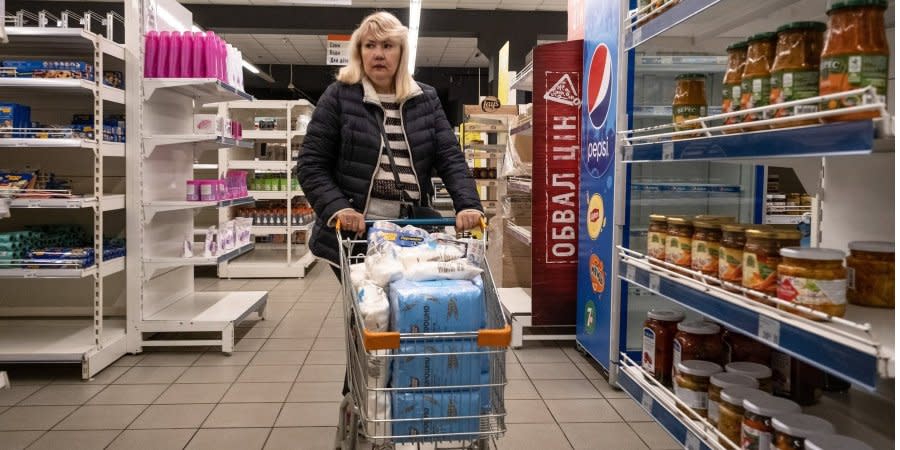What imported goods are in short supply in stores, and when will the shortages end?

The full-scale war with the Russian invaders continues in Ukraine into its fifth month and stores are unable to provide their pre-war range of good. There are problems with the supply of cheeses, seafood, wine, and beer, and even spoons and forks. That’s because these goods weren’t on the list of critical imports for which businesses can buy currency to purchase and import. Logistics is also becoming more expensive – that is why the prices of imported goods have already increased by 16% since the beginning of the war.
What products are missing
What products are missing? According to Metro Ukraine, this has affected bakery products (storable bread, toast bread, grissini, croissants, etc.), some types of dairy products (butter, milk, yogurts and dessert dairy products, fermented milk products, cream, etc.).
Vegetables and salads cannot be delivered from the occupied territories, and they are not included in the list of critical imports. There is a shortage of frozen and chilled fish and seafood. Stocks of olives are also running out, and new batches are not yet imported. There is a strong shortage of potato chips, because the large local producers Monedelez and Sandora do not have the ability to produce goods. Only small manufacturers remain, which can always cover 100% of the needs of the local market.
Read also: Ukrainian financier tells of serious challenges facing not only Ukraine, but the whole world
The segment of chocolate spreads has been completely withdrawn, like Nutella, as well as expensive chocolate. Suppliers like Ferrero, Lindt, and partially Mars cannot resume work.
Alcoholic drinks are also scarce. At first, there were widespread shortages of beer on the market, as Ukrainian producers didn’t immediately resume production within the country.
Currently, there are disruptions with wine supplies, says the director of the import company Vitis Group Sergii Mazur. “The supply is getting smaller. Everyone will reduce the range of provided goods and focus on cheaper products,” he says.
There are difficulties with non-food products as well. For example, at first the list of critical imports didn’t include raw materials for jar lids. This has created an artificial shortage in the market and rising prices during the canning season. This raw material was added to the list of critical imports only in June.
Read also: Ukraine gradually emerging from fuel crisis, says Zelenskyy
The list also didn’t include everyday goods like spoons, forks and ceramic dishes. Only glass, porcelain, and seasonal goods like furniture. These groups account for about 80% of the import market in the non-food category.
“Approximately 20% of the JYSK’s assortment is not included in the list of critical imports,” says JYSK country manager in Ukraine Yevhen Ivanytsia. “It’s household goods, products for windows and bathrooms. We are talking about half a thousand active articles.” According to him, the network imports these products, but will be able to pay for them only after the list of critical imports is canceled or expanded.
A basic set of household appliances and electronics is on the list. You can buy a washing machine, refrigerator or vacuum cleaner, according to NV Business analysis of websites of specialized stores. However, when equipment of a non-standard size or increased power is required, problems can arise.
National Bank of Ukraine is preparing changes
Supply is also constrained by logistical problems. The director of the Lamarin transport company Alexander Lazarev notes that the warehouses of large networks were destroyed near Kyiv by Russian invaders.
“Many companies bring trucks with goods from abroad directly to supermarkets and don’t store them in warehouses that can be hit by a Russian missile again,” says Lazarev. “It takes longer, so some items are missing. Just delivering products to Ukraine has become more difficult. Ports are blocked, delivery by transport is more expensive. Difficult logistics and the devaluation of the Ukrainian hryvnia led to higher prices even for critical imports.
Read also: Ukrainian retail workers talk about challenges of doing business during full-scale invasion
The problem with the purchase of foreign currency to pay for imported products may be resolved in July, says Lazarev.
Since July 1, zero duties and VAT on imported goods and cars have been canceled in Ukraine. "Everyone expects the National Bank to lift restrictions on critical imports," Lazarev says.
This summer we should expect an unfreeze of the official exchange rate of the National Bank (UAH 29.25 / $ - ed.), says the head of the analytical department of Alfa-Bank Ukraine, Oleksiy Blinov, in an interview with NV Business.
“In June, the volume of international financial assistance to Ukraine increased drastically,” notes Blinov. “This will contribute to the stability of the potential “exchange rate transition” due to the greater potential for selling foreign currency on the market.”
But high inflation and reduced incomes could prevent Ukrainians from buying more imported goods. Consumers are saving money and switching towards cheaper groups of goods.

